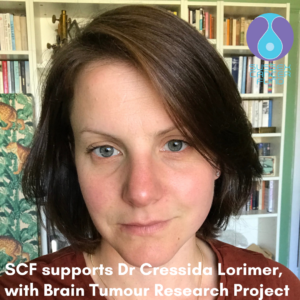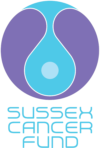 The Sussex Cancer Fund supported the research of Dr Cressida Lorimer, a clinical oncology registrar, by funding her project. Dr Lorimer completed her research in November 2018 and we are now helping Cressida co-ordinate an international project through the purchase of a simple data gathering technology – Survey Monkey.
The Sussex Cancer Fund supported the research of Dr Cressida Lorimer, a clinical oncology registrar, by funding her project. Dr Lorimer completed her research in November 2018 and we are now helping Cressida co-ordinate an international project through the purchase of a simple data gathering technology – Survey Monkey.
Initially, Cressida examined the management of elderly patients with aggressive brain tumours. There has been an international call for increasing the amount of research specifically aimed at older patients with cancer and there is currently a paucity of clinical trials amongst the neuro-oncology group. Dr Lorimer examined how we can better individualise treatment strategies, assessing patients’ clinical parameters alongside imaging and molecular biomarkers and has presented her work at a number of national and international conferences.
Dr Lorimer’s work was then extended when she set up a collaboration across UK neuro-oncology centres with a prospective feasibility study in the Sussex Cancer Centre, The Royal Marsden Hospital and The Beatson West of Scotland Cancer Centre. This looked at how older patients with brain tumours are assessed for treatment and the results were published in an international peer-reviewed journal. Dr Lorimer is currently still running a multicentre trial examining the use of pre-treatment scans to help try and predict who may be more prone to side effects from the radiotherapy treatment of brain tumours. This is open across 12 sites within the UK and results are expected in the spring of 2021.
However, following the success of these early phases of research, Cressida’s work has received a lot of international attention and data from around the world is now contributing to the study.
We asked Cressida a little more about the project and how SCF is helping
Dr Cressida Lorimer, “Survey Monkey is being used in this study to collect data from an international audience of neuro-oncologists. The survey is being supported by the Society for Neuro-Oncology (SNO, based in America but is the largest international neuro-oncology community). We are looking at how consultant neuro-oncologists approach the assessment of older patients with brain tumours when deciding on treatment.
This study was performed by us previously in the UK however in order to reach a wider audience we needed to upgrade the Survey Monkey package we were using. This has now enabled us to reach over 1000 neuro-oncologists worldwide. This will give us a much clearer picture of the international approach to assessing older brain tumour patients. The results of the survey will then be presented at the annual SNO meeting which this year is in Austin, Texas in November.
The results should be available at the end of this month. It is particularly looking at older patients who have Glioblastomas (the commonest primary malignant brain tumour in the adult population). This tumour affects around 2,200 people per year in England and carries a poor prognosis, especially in the elderly, of around 6 months. Treatment is often aimed at prolonging life rather than cure and so it is very important that the side effects of treatment do not outweigh the benefit. Therefore selecting the right patients for treatment is crucial. This is currently unstandardised in the older population and this survey is a step towards trying to establish an international consensus on assessment techniques.
With thanks to SCF this simple software will help us coordinate data from an international neuro-oncology community which could ultimately help shape the way older patients with glioblastoma are assessed for treatment across the world in the future.”
If you would like to support projects like those which will help improve the treatment for Cancer Patients for generations to come please donate if you can.

